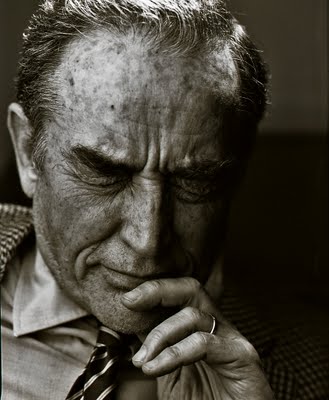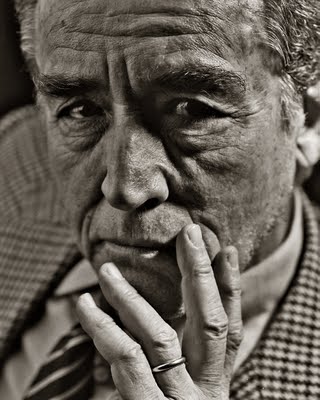The Snack Thief, Andrea Camilleri 1996

The suave and handsome 6-foot-2 man in a herringbone jacket and striped tie who opened the door of his room at the Meridien Hotel (now the Sutton Place) on January 5, 1991 reacted to my stare by stating, “I played centre in my secondary school team.”
Genoa-born (in 1922) Italian actor Vittorio Gassman faced my camera. I was to wait as he had to create a character for my camera. He bent his head and closed his eyes. Ignoring an experienced film critic (my friend John Lekich) on asking actors about former spouses, I mentioned Shelley Winters. Gassman’s reaction was a scary stare and silence.
On January 6, 1991, the Vancouver Italian Community and a few others braved a snowstorm to attend Vittorio Gassman – In Words – A Recital of Theatre and Poetry at the Vancouver Playhouse. The program consisted of mostly virtuoso monologues of Dante Alighieri, Cesare Pascarela, Franz Kafka, Pablo Neruda and Lawrence Ferlinghetti.
Also on the bill was Kean, a work by Alexandre Dumas adapted by Jean Paul Sartre that was a revelation to those of us who knew only of Gassman’s Hollywood career in such movies as Robert Altman’s A Wedding, Paul Mazursky’s Tempest (with Molly Ringwald in her debut feature film!) and King Vidor’s War and Peace, or even to those movie-goers who might have seen such Italian classics as Big Deal on Madonna Street or Gassman’s 1975 best actor’s performance at Cannes for the original Scent of a Woman. Few would have known that before making movies in Italy in 1946, he had performed in 40 plays since his professional debut in 1943.

While Gassman’s Italian and his French were mostly Greek to me, I found I understood a lot from his eloquent acting. It was appropriate that the man who popularized Shakespeare’s plays in Italy and Pirandello and Dante to the world ended the evening’s performance with Dante’s 31st Canto from the Inferno. Line 75 reads: “His very babbling testifies the wrong he did on earth: he is Nimrod, through whose evil mankind no longer speaks a common tongue.”
Even though Dante placed the Babylonian king in Hell, blaming him for Babel, it was Gassman, through his many films (124) and frequent international tours who championed the universal appeal of good theatre.
Gassman, who suffered chronic emphysema, bronchitis, high blookd pressure and depression, abandoned stage acting in February 2000. He died on June 29 of heart failure in Rome. He told his final audience, “Death does not obsess me – it disgusts me.”
The Italians Part II
The Italians Part III